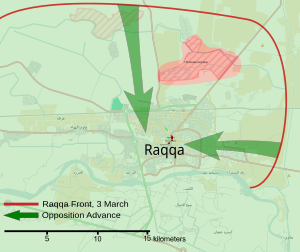| Battle of Raqqa | |||||||||
|---|---|---|---|---|---|---|---|---|---|
| Part of the Raqqa campaign (2012–2013) and the Syrian civil war | |||||||||
 Course of the battle and control in Raqqa as of October 2013 Syrian Arab Army control Opposition control | |||||||||
| |||||||||
| Belligerents | |||||||||
|
| |||||||||
| Commanders and leaders | |||||||||
|
Unknown top provincial al-Nusra commander †[4] Unknown top provincial Ahrar al-Sham commander †[4] Col. Moataz Raslan (top FSA commander)[5] |
Brig. Gen. Khaled al-Halabi (Raqqa's state security head)[6] Maj. Gen. Hassan Jalili (POW) (Provincial governor)[6] Suleiman Suleiman (POW) (Provincial Baath party's secretary general)[6] | ||||||||
| Units involved | |||||||||
|
|
Local police | ||||||||
| Strength | |||||||||
| ≈7,000 fighters[9] | 400 soldiers | ||||||||
| Casualties and losses | |||||||||
| 40–50 killed[4][10][11] |
30 killed[4][12][13] 300 captured[14] | ||||||||
|
More than 100 civilians killed from 4–5 March (Syrian Observatory for Human Rights estimate)[15] 39 killed in air raids on 6 March[13] | |||||||||
The battle of Raqqa, also known as the first battle of Raqqa and code named by rebels as the "Raid of the Almighty",[7] was fought for control of the northern Syrian city of Raqqa during the Syrian civil war between Sunni Islamist rebel insurgents and the Syrian Arab Army. Rebel forces launched the offensive in early March 2013, and declared themselves in "near-total control" on 5 March, making it the first provincial capital claimed to come under rebel control in the civil war.[16] The battle, on the opposition side, was primarily led by the al-Nusra Front and Ahrar al-Sham.[17]
- ^ "Activists: Syrian regime bombs rebel-held city". USA Today.
- ^ Winter (2014), p. 6.
- ^ a b "Rebels look to extend gains from Raqqa | News, Middle East". The Daily Star. 6 April 2013. Retrieved 30 August 2013.
- ^ a b c d Cite error: The named reference
mondaywas invoked but never defined (see the help page). - ^ "Syrian rebels seek relevance by joining Turkey's offensive". ABC News. Archived from the original on 9 February 2018. Retrieved 9 February 2018.
- ^ a b c Cite error: The named reference
RaqqaKandaharwas invoked but never defined (see the help page). - ^ a b c Matthew Barber (3 April 2013). "The Raqqa Story: Rebel Structure, Planning, and Possible War Crimes". Syria Comment.
- ^ "انضمـام ثاني أكبر تشكيل عسكري في حلب إلى حركـة أحرار الشام" [The second largest military formation in Aleppo joins the Ahrar Sham movement]. Baladi News. 14 December 2015. Archived from the original on 17 May 2019. Retrieved 30 September 2018.
- ^ "Los rebeldes quieren forzar el colapso del régimen en el este de Siria" (in Spanish). El Mundo. 19 April 2013. Retrieved 22 November 2015.
- ^ "Syria crisis: Warplanes 'bomb Raqqa after rebel gains'". BBC News. 5 March 2013.
- ^ Cite error: The named reference
raqqahcitywas invoked but never defined (see the help page). - ^ "نحو 190 سقطوا يوم امس". Archived from the original on 7 January 2014.
{{cite web}}: CS1 maint: bot: original URL status unknown (link) - ^ a b Cite error: The named reference
39killedwas invoked but never defined (see the help page). - ^ Stack, Liam. "Syrian Rebels Interview Captured Government Officials". Syria: Thelede.blogs.nytimes.com. Retrieved 3 May 2022.
- ^ Zeina Karam (5 March 2013). "Syrian jets bomb northern city overrun by rebels". TheGuardian.com. Associated Press.
- ^ "Syria rebels capture northern Raqqa city – Middle East". Al Jazeera English.
- ^ Rosenblatt, Nate; Kilcullen, David (2019). How Raqqa Became the Capital of ISIS: A Proxy Warfare Case Study. New America, Arizona State University, Center on the Future of War. p. 16.